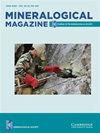Quantitative evaluation of metamictisation of columbite-(Mn) from rare-element pegmatites using Raman spectroscopy
IF 1.4
3区 地球科学
Q2 MINERALOGY
引用次数: 0
Abstract
Abstract Raman spectroscopic analysis was performed on columbite-(Mn) samples from a variety of previously studied rare-element pegmatites in Xinjiang, China, including the Jing'erquan No. 1 spodumene-subtype, Dakalasu No. 1 beryl–columbite-subtype and Kalu'an spodumene-subtype pegmatites, to quantify the relationship between the degree of metamictisation of columbite and Raman spectra. For all of the analysed columbites-(Mn), the position (p) and the full width at half maximum (FWHM) of the strongest band, A1g vibration mode related to the Nb/Ta–O bond, in the Raman spectra have a negative correlation. Combined with previously determined U–Pb isotopic data and major–minor-element data for the columbites-(Mn), the degree of metamictisation was quantified using the alpha-decay dose (D) and displacement per atom (dpa), both of which were corrected for effects caused by annealing. The results demonstrate that the columbite-(Mn) from Jing'erquan and Kalu'an are very crystalline, whereas those from Dakalasu are transitional between crystalline and amorphous stages. The main factor influencing the key parameters, i.e. band position and FWHM, of the strongest Raman band of columbite-(Mn) is metamictisation caused by radiation damage, whereas composition and crystal orientation have limited influence. A set of equations are established to quantify the degree of metamictisation of columbite using the band position and the full width at half maximum: FWHM = 8.309 × ln(aD) + 30.11 (R2 = 0.9861); p = –5.187 × ln(aD) + 867.09 (R2 = 0.966); FWHM = 8.1453 × ln(adpa) + 48.425 (R2 = 0.9822); and p = –5.078 × ln(adpa) + 855.67 (R2 = 0.9594).用拉曼光谱定量评价稀有元素伟晶岩中铌矿-(Mn)的变质作用
摘要对新疆多种稀有元素伟晶岩中的铌矿(Mn)样品进行了拉曼光谱分析,以量化铌矿的变质作用程度与拉曼光谱之间的关系。对于所有分析的铌矿-(Mn),拉曼光谱中与Nb/Ta–O键相关的最强带A1g振动模式的位置(p)和半峰全宽(FWHM)具有负相关性。结合之前确定的铌矿的U–Pb同位素数据和主元素-次元素数据,使用α衰变剂量(D)和每原子位移(dpa)对变质作用的程度进行了量化,这两个数据都针对退火引起的影响进行了校正。结果表明,来自鄂尔多斯泉和卡鲁安的铌矿是非常结晶的,而来自达喀拉苏的铌矿则是在结晶和非结晶阶段之间过渡的。影响铌矿-(Mn)最强拉曼带的关键参数(即带位置和FWHM)的主要因素是辐射损伤引起的变质作用,而成分和晶体取向的影响有限。利用能带位置和半峰全宽,建立了一组方程来量化铌矿的变质作用程度:FWHM=8.309×ln(aD)+30.11(R2=0.9861);p=–5.187×ln(aD)+867.09(R2=0.966);FWHM=8.1453×ln(adpa)+48.425(R2=0.9822);ln(adpa)+855.67(R2=0.9594)。
本文章由计算机程序翻译,如有差异,请以英文原文为准。
求助全文
约1分钟内获得全文
求助全文
来源期刊

Mineralogical Magazine
地学-矿物学
CiteScore
4.00
自引率
25.90%
发文量
104
审稿时长
6-12 weeks
期刊介绍:
Mineralogical Magazine is an international journal of mineral sciences which covers the fields of mineralogy, crystallography, geochemistry, petrology, environmental geology and economic geology. The journal has been published continuously since the founding of the Mineralogical Society of Great Britain and Ireland in 1876 and is a leading journal in its field.
 求助内容:
求助内容: 应助结果提醒方式:
应助结果提醒方式:


